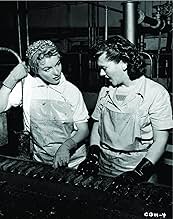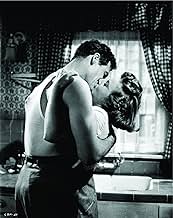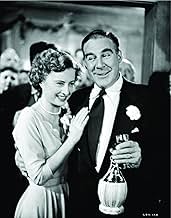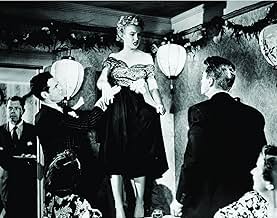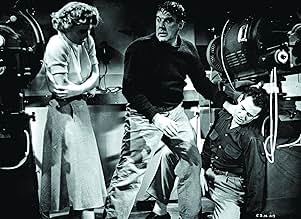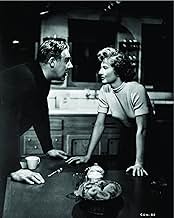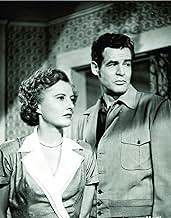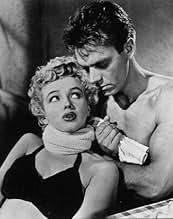IMDb RATING
7.0/10
8K
YOUR RATING
Mae Doyle comes back to her hometown a cynical woman. Her brother Joe fears that his love, fish cannery worker Peggy, may wind up like Mae. Mae marries Jerry and has a baby; she is happy but... Read allMae Doyle comes back to her hometown a cynical woman. Her brother Joe fears that his love, fish cannery worker Peggy, may wind up like Mae. Mae marries Jerry and has a baby; she is happy but restless, drawn to Jerry's friend Earl.Mae Doyle comes back to her hometown a cynical woman. Her brother Joe fears that his love, fish cannery worker Peggy, may wind up like Mae. Mae marries Jerry and has a baby; she is happy but restless, drawn to Jerry's friend Earl.
- Awards
- 3 wins total
William Bailey
- Waiter
- (uncredited)
Harry Baum
- Restaurant Patron
- (uncredited)
Dan Bernaducci
- Guest
- (uncredited)
Albert Cavens
- Restaurant Patron
- (uncredited)
Dick Cherney
- Fisherman
- (uncredited)
Charles Cirillo
- Restaurant Patron
- (uncredited)
Irene Crosby
- Guest
- (uncredited)
Russell Custer
- Fisherman
- (uncredited)
Tony Dante
- Fisherman
- (uncredited)
Roy Darmour
- Man
- (uncredited)
- Director
- Writers
- All cast & crew
- Production, box office & more at IMDbPro
Featured reviews
This Fritz Lang film has been largely ignored though in it's way it is as psychologically astute as many of his better known works such as "Scarlett Street". In transposing a Clifford Odets play from New York to a Californian fishing community some of the more florid dialogue seems unnaturally heightened but the performances of the three principals (Barbara Stanwyck, Robert Ryan and particularly Paul Douglas) are stunning and the emotional core of the film is so strong that an audience can feel bruised by what's on screen. The blue collar milieu is perfectly evoked, the black-and-white cinematography by Nicholas Musuraca is first-rate and even the score seems understated, adding to, rather than detracting from the dramatic effect. Essential viewing.
clash by night is a great example of what a difference great acting can make. those were the days! story is full of usual cliches, but stanwyck, paul douglas, robert ryan, and a young marilyn monroe: wow!!! and it shows how sexy a film can be without any "sex scenes" or even a hint of nudity.
Why did Fritz Lang want to make this movie? Did he select the cast? "Clash by Night" was part of the recent TCM tribute to Lang, and following after the early European masterpieces, "Metropolis," and "M," one wonders how much Lang modified and compromised his early filmmaking ideals and style in resettling in Hollywood and jockey for financial support. I've not seen or read the original Odets play on which the film is based, but whatever Lang's reason for choosing it, one has to ask how the finished movie fits into Lang's output, especially the stark, powerful, stylized early pieces. A couple of features stand out: Lang always had a message-- nothing was mere observation -- that shaped the plot and characters' motivations. If Good and Evil stand out too sharply in black and white terms, Lang is still intent on sharp analysis of the turns and twists on the road to Good or Evil. Forces beyond individual characters' control are harnessed and made part of the characters motivations. Then Lang sets them on their inevitable course, and we watch, sometimes in shock or agony.
In "Clash," the imagery-- contrasting shots of sea, clouds, birds,etc, register his endorsement of the natural order of things as Good. In Metropolis, the natural order of humanity toward others was stamped out by the drive for materialism and industrial supremacy, Evil (historically predicating Nazism), symbolized always by the grinding and spouting machinery. All of the characters are tuned to a high pitch and respond with intensity. Lang's style of directing brought out the extremes -- the fortissimos-- in his actors, no matter whom he cast. Lang must have been an extraordinarily demanding director to elicit such razor-edge performances from his actors.
The fact that all the actors in "Clash" are familiar to us from other films meant Lang had to pit them against each other to an even keener degree. They are all desperate for something, whether they reveal it on the surface or not. For an actress like Stanwyck, this was an easily achieved emotional state, and she had to accept the concept of "aging" in her role. If anything, Lang forced her to keep her hard edges up a bit too much, allowing some softening only in the rather quick ending. This bit of character transformation happens only after she sees the true desperation that she's driven Paul Douglas to in the final scene in the film room.
Ah, yes, the film room. If that isn't an obvious set piece, I don't know what is. Ryan, as the third wheel, runs the projectors. Much of his dialogue is double-edged. And Ryan's character is the most desperate, the least yielding, even to Stanwyck, making his profession as a film projectionist ironic and something artificial, compared to the "natural" metier of Douglas and his father's as fishermen. They draw on the bounty of nature and so symbolize -- purposely and obviously -- pure goodness in human nature. Douglas gives a generous, sweet-tough-guy performance that is Ryan's match. Douglas never guesses what temptation he presents to his wife Stanwyck when he casually invites his best friend to stay with them. This generosity extends in particular to his overlooking faults, whether of his leeching uncle or his friend's sarcstic selfishness.
The role of the father, as a link to the Old Country and its solid gold ways is well-placed. His speech at the wedding puts his character in a nutshell: God made love, God made wine, God made friends, let everyone enjoy them, or some such pithy message. For a filmmaker like Lang, and other transplanted Europeans, the sacrifice of deep roots of their heritage and language could only be compensated for by an equally deep absorption of the customs and values of the New Country. Emigré geniuses like Lang, Wilder, or von Stroheim, never left anything behind, they reabsorbed and refashioned their material through their sharp perception of human nature in this new context. I think that is why we feel this movie to be beyond mere melodrama. I couldn't stop watching it -- the characters caught me in their predicament: they reach a universal dimension in the very simplicity and obviousness of their situations and temptations. Lang's role was to push them to that level recognition in themselves.
Even the seemingly secondary characters like Stanwyck's brother and his girlfriend, the latter played surprisingly and delightfully by a young Marilyn Monroe, give strong performances. Marilyn already shows her subtlety and emotional vulnerability. Her spontaneous response to Stanwyck's return to her brother's apartment at the beginning revealed a genuine charm, and she provided a needed sparkle in this otherwise grim film.
So why see "Clash"? Even a secondary work by a master bears his mark, and to see the mark and its features in the context of film history is still a worthwhile effort.
Of Four ****, three ***.
In "Clash," the imagery-- contrasting shots of sea, clouds, birds,etc, register his endorsement of the natural order of things as Good. In Metropolis, the natural order of humanity toward others was stamped out by the drive for materialism and industrial supremacy, Evil (historically predicating Nazism), symbolized always by the grinding and spouting machinery. All of the characters are tuned to a high pitch and respond with intensity. Lang's style of directing brought out the extremes -- the fortissimos-- in his actors, no matter whom he cast. Lang must have been an extraordinarily demanding director to elicit such razor-edge performances from his actors.
The fact that all the actors in "Clash" are familiar to us from other films meant Lang had to pit them against each other to an even keener degree. They are all desperate for something, whether they reveal it on the surface or not. For an actress like Stanwyck, this was an easily achieved emotional state, and she had to accept the concept of "aging" in her role. If anything, Lang forced her to keep her hard edges up a bit too much, allowing some softening only in the rather quick ending. This bit of character transformation happens only after she sees the true desperation that she's driven Paul Douglas to in the final scene in the film room.
Ah, yes, the film room. If that isn't an obvious set piece, I don't know what is. Ryan, as the third wheel, runs the projectors. Much of his dialogue is double-edged. And Ryan's character is the most desperate, the least yielding, even to Stanwyck, making his profession as a film projectionist ironic and something artificial, compared to the "natural" metier of Douglas and his father's as fishermen. They draw on the bounty of nature and so symbolize -- purposely and obviously -- pure goodness in human nature. Douglas gives a generous, sweet-tough-guy performance that is Ryan's match. Douglas never guesses what temptation he presents to his wife Stanwyck when he casually invites his best friend to stay with them. This generosity extends in particular to his overlooking faults, whether of his leeching uncle or his friend's sarcstic selfishness.
The role of the father, as a link to the Old Country and its solid gold ways is well-placed. His speech at the wedding puts his character in a nutshell: God made love, God made wine, God made friends, let everyone enjoy them, or some such pithy message. For a filmmaker like Lang, and other transplanted Europeans, the sacrifice of deep roots of their heritage and language could only be compensated for by an equally deep absorption of the customs and values of the New Country. Emigré geniuses like Lang, Wilder, or von Stroheim, never left anything behind, they reabsorbed and refashioned their material through their sharp perception of human nature in this new context. I think that is why we feel this movie to be beyond mere melodrama. I couldn't stop watching it -- the characters caught me in their predicament: they reach a universal dimension in the very simplicity and obviousness of their situations and temptations. Lang's role was to push them to that level recognition in themselves.
Even the seemingly secondary characters like Stanwyck's brother and his girlfriend, the latter played surprisingly and delightfully by a young Marilyn Monroe, give strong performances. Marilyn already shows her subtlety and emotional vulnerability. Her spontaneous response to Stanwyck's return to her brother's apartment at the beginning revealed a genuine charm, and she provided a needed sparkle in this otherwise grim film.
So why see "Clash"? Even a secondary work by a master bears his mark, and to see the mark and its features in the context of film history is still a worthwhile effort.
Of Four ****, three ***.
Barbara Stanwyck, Paul Douglas, Robert Ryan, Marilyn Monroe, and Keith Andes star in "Clash by Night," based on the play by Clifford Odets that flopped on Broadway. It gets the full-blown treatment on the screen, with Fritz Lang directing and a strong group of actors.
Stanwyck is a world-weary woman who comes back to her roots because "home is where you go when you run out of places," and immediately attracts male attention from both Ryan and Paul Douglas. She's instantly attracted to Ryan, and each recognizes in the other an edginess and need for excitement.
To fight these urges, which haven't brought her any joy in the past, she marries Douglas, a simple fisherman who is deeply in love with her. It's not long before she gets antsy.
The acting is terrific, but the emotions are very big - possibly too big for the screen and more suited to the stage. Though everyone is excellent, Douglas has the sympathetic role and breaks your heart as the cuckolded husband.
Ryan is great as a volcano waiting to erupt, and Stanwyck's portrayal is ferociously honest and layered. She was 45 at the time of thee filming and obviously playing someone a good 10 years younger, but it still works.
Marilyn Monroe has a supporting role playing the girlfriend of handsome Keith Andes. He mainly shows off his physique, though he was actually a good actor who had success in TV and was also a powerful singer, playing opposite Lucille Ball on Broadway in "Wildcat."
Monroe, mostly in jeans and with a swimsuit scene, is beautiful and her acting is very natural. Later on in her career, she overpronounced her words, which worked well in comedy but less so in drama.
This is a very good movie with vigorous direction by Lang. There's just not much about it that's subtle.
Stanwyck is a world-weary woman who comes back to her roots because "home is where you go when you run out of places," and immediately attracts male attention from both Ryan and Paul Douglas. She's instantly attracted to Ryan, and each recognizes in the other an edginess and need for excitement.
To fight these urges, which haven't brought her any joy in the past, she marries Douglas, a simple fisherman who is deeply in love with her. It's not long before she gets antsy.
The acting is terrific, but the emotions are very big - possibly too big for the screen and more suited to the stage. Though everyone is excellent, Douglas has the sympathetic role and breaks your heart as the cuckolded husband.
Ryan is great as a volcano waiting to erupt, and Stanwyck's portrayal is ferociously honest and layered. She was 45 at the time of thee filming and obviously playing someone a good 10 years younger, but it still works.
Marilyn Monroe has a supporting role playing the girlfriend of handsome Keith Andes. He mainly shows off his physique, though he was actually a good actor who had success in TV and was also a powerful singer, playing opposite Lucille Ball on Broadway in "Wildcat."
Monroe, mostly in jeans and with a swimsuit scene, is beautiful and her acting is very natural. Later on in her career, she overpronounced her words, which worked well in comedy but less so in drama.
This is a very good movie with vigorous direction by Lang. There's just not much about it that's subtle.
The bitter and cynical Mae Doyle (Barbara Stanwyck) returns to the fishing village where she was raised after deceptive loves and life in New York. She meets her brother, the fisherman Joe Doyle (Keith Andes), and he lodges her in his home. Mae is courted by Jerry D'Amato (Paul Douglas), a good and naive man that owns the boat where Joe works, and he introduces his brutal friend Earl Pfeiffer (Robert Ryan), who works as theater's projectionist and is cheated by his wife. She does not like Earl and his jokes, but Jerry considers him his friend and they frequently see each other. Mae decides to accept the proposal of Jerry and they get married and one year later they have a baby girl. When the wife of Earl leaves him, he becomes depressed and Mae, who is bored with her loveless marriage, has an affair with him.
"Clash by Night" is an unpleasant drama with a bitter story and a moralist conclusion, actually a minor film of Master Fritz Lang in his career in Hollywood. Barbara Stanwyck has another magnificent performance in the role of a woman hardened by her bad sentimental and life experiences in the big city that returns home due to the lack of option. There is one quote ("When you run out of places, home is all you have left") that defines her mood. Paul Douglas plays a good honest man that nurses his old father, helps his crook alcoholic uncle and accepts the past of Mae Doyle, giving her a second chance. Robert Ryan plays a despicable rude man and disloyal friend. The affair between Mae and Earl has no chemistry and is only sexual desire. Last but not the least, it is delightful to see Marilyn Monroe playing a silly character. My vote is seven.
Title (Brazil: "Só a Mulher Peca" ("Only the Woman Sins")
"Clash by Night" is an unpleasant drama with a bitter story and a moralist conclusion, actually a minor film of Master Fritz Lang in his career in Hollywood. Barbara Stanwyck has another magnificent performance in the role of a woman hardened by her bad sentimental and life experiences in the big city that returns home due to the lack of option. There is one quote ("When you run out of places, home is all you have left") that defines her mood. Paul Douglas plays a good honest man that nurses his old father, helps his crook alcoholic uncle and accepts the past of Mae Doyle, giving her a second chance. Robert Ryan plays a despicable rude man and disloyal friend. The affair between Mae and Earl has no chemistry and is only sexual desire. Last but not the least, it is delightful to see Marilyn Monroe playing a silly character. My vote is seven.
Title (Brazil: "Só a Mulher Peca" ("Only the Woman Sins")
Did you know
- TriviaThis movie was shot while Barbara Stanwyck was in the process of divorcing Robert Taylor. The movie also features the rising young star Marilyn Monroe. Barbara gives a good performance in one of her most memorable films. Despite her emotional devastation due to the divorce, the crew noted Stanwyck's lack of a diva tantrum. Fritz Lang later said, "She's fantastic, unbelievable, and I liked her tremendously. When Marilyn missed her lines - which she did constantly - Barbara never said a word."
- GoofsWhile at the tavern, Mae and Jerry watch the moon rise over the ocean. The film takes place in Monterey, California, which is on the West coast, where the moon rises over the hills and sets on the ocean.
- Crazy creditsand introducing Keith Andes
- ConnectionsEdited into Les Amoureux du cinéma (1987)
- SoundtracksI Hear a Rhapsody
Written by George Fragos (uncredited), Jack Baker (uncredited) and Dick Gasparre (uncredited)
Sung by Tony Martin
- How long is Clash by Night?Powered by Alexa
Details
Box office
- Gross worldwide
- $62
- Runtime
- 1h 45m(105 min)
- Color
- Aspect ratio
- 1.37 : 1
Contribute to this page
Suggest an edit or add missing content


